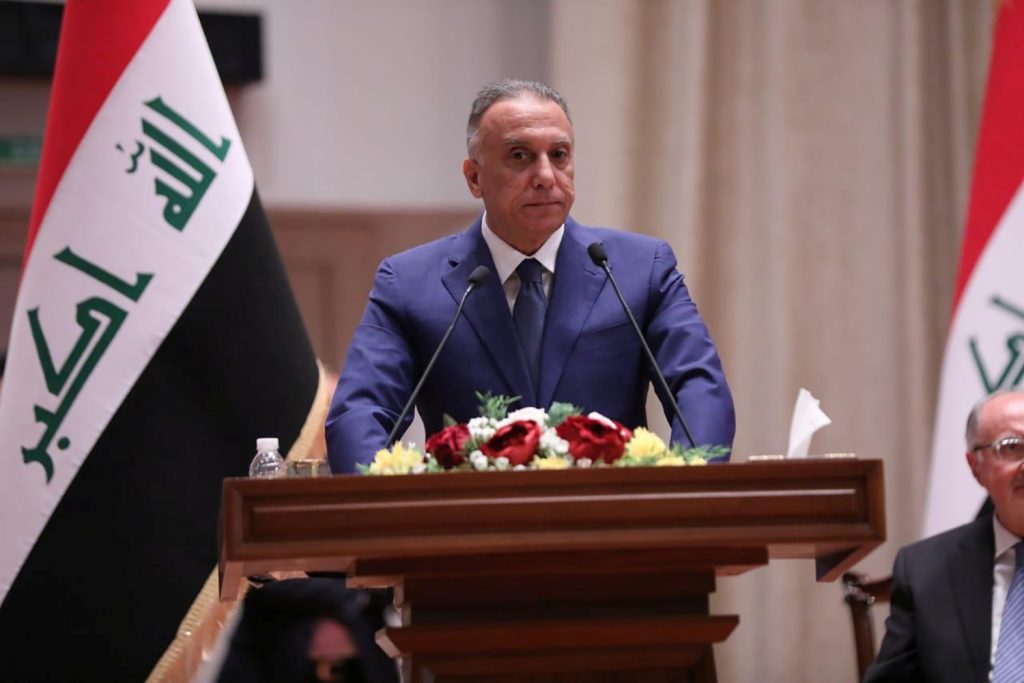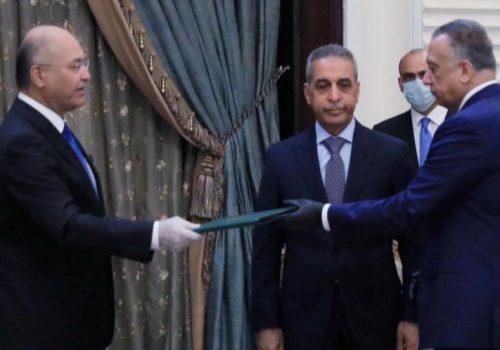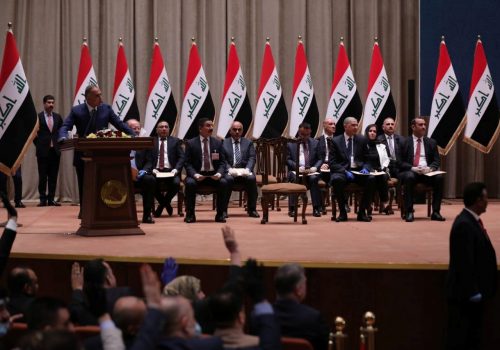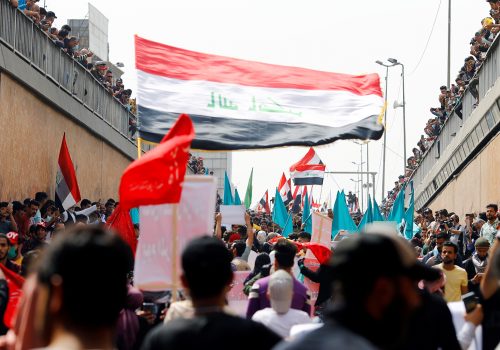Iraq’s months-long quest to form a national government reached a major milestone on May 6 when a partial government under new prime minister Mustafa al-Kadhimi was approved by lawmakers. Al-Kadhimi—who previously served as Iraq’s national intelligence chief—was nominated by Iraqi President Barham Salih on April 9 after two previous nominees failed to form a government. Although fifteen of the major cabinet posts were approved by the parliament, several others have not yet been confirmed—including foreign affairs, justice, oil, agriculture, and trade—due to failure to reach an agreement between major parties on their allocation.
A US State Department spokesperson said the US Secretary of State Mike Pompeo talked with al-Kadhimi on May 6 to congratulate him on the new government and renew a waiver allowing Iraq to import sanctioned Iranian electricity for 120 days “as a display of our desire to help provide the right conditions for success.”
Abbas Kadhim, director of the Atlantic Council’s Future of Iraq Initiative:
“The formation of a fully authorized government is a welcome event. If nothing else, it provides a chance for Iraq to address its most pressing twin crises relating to the low oil prices and COVID-19 as well as to seek to heal the deep wounds in state-society relations, particularly after the bloodshed following the crackdown on the protesters that occurred in the fall of 2019.
“Some Iraqis desire an early election, and Prime Minister al-Kadhimi included an early election in his government program, but this is easier said than done. The new government will be necessarily preoccupied with greater challenges than organizing a snap election. Iraq, like most of the world, must respond to the COVID-19 pandemic but with much lower levels of preparedness and a large deficit in medical and financial resources. This global threat is occurring along with another: the sharp decrease in the price of oil, which accounts for more than 90 percent of Iraq’s revenues. If the current oil price trend continues through 2020 and beyond, Iraq’s government will not be able to survive politically or economically. Therefore, the government must focus on this dire situation and prioritize quick cross-sector economic measures. This is a more urgent endeavor than a snap election that would not be held and introduce another government before the second half of 2021 at best, a few months before the next scheduled elections.
“The new government will not be ready for the fast approaching date for the US-Iraq Strategic Dialogue—scheduled for June 10—or meeting the high expectations of both sides for a positive restructuring of bilateral relations. The absence of a minister of foreign affairs will place all the burden on the prime minister to prepare for the talks and set the agenda. Holding the talks under these asymmetrical conditions would ensure an unsatisfactory outcome. Iraqi politicians do not have a consensus on what can be accomplished from this round of talks and what endgame should be sought. A government with a diplomatic gap in its formation will only exacerbate the problems.”
Read Kadhim’s full piece here: https://www.atlanticcouncil.org/blogs/menasource/new-iraqi-government-must-face-a-pandemic-and-oil-price-drop/
Kirsten Fontenrose, director of the Scowcroft Center for Strategy and Security’s Middle East Security Initiative:
“Can we call the partial formation of the new Iraqi Cabinet a gesture of de-escalation between Iran and United States? Because we need one. And it is. The Iran-backed Hashd militias in Iraq affiliated with hardline parties of the Shia block have not attacked US forces in Iraq since Iran vowed to allow Mustafa al-Kadhimi the room to form a government. The United States still has not retaliated against these militias for the early March strikes against US forces in Iraq and on May 6 announced a four-month electricity waiver that allows Iraq to continue to import over-priced gas from Iran.
“While not all of the cabinet members have been named, some of those now agreed upon are the smartest possible choices, not in terms of Iran’s interests or those of the United States, but in terms of Iraq’s. Ali Al-Allawi in the Finance portfolio, for instance, is a proven technocrat who is exceedingly qualified for the role. His presence in the cabinet should reassure nervous but interested potential foreign investors.
“Al-Kadhimi states that his top two priorities are addressing COVID-19 and bringing to justice those responsible for violence against protestors in past months. These are two tough tasks, the second fraught with political danger for himself and his agenda. But they are tasks that the international community can and should wholeheartedly support.
“We can’t yet know whether the June 10-11, 2020 dates for talks between the United States and the Iraqi government on the future of the relationship are realistic. Al-Kadhimi may not have built consensus behind a unified Iraqi position on the status of US forces by then, for example. But this swift and sound formation of the partial cabinet thus far gives hope that when those talks do happen, Iraq’s interests will be well-represented.”
Thomas S. Warrick, nonresident senior fellow with the Rafik Hariri Center and Middle East Programs at the Atlantic Council:
“In the early hours of May 7, the Iraqi Council of Representatives confirmed Mustafa al-Kadhimi and fifteen members of his cabinet to form the next government of Iraq. Iraq needs to recover from the 2014-2019 partial ISIS occupation, and wants to not be a battleground between Iran and the United States. Iraq has to deal with the COVID-19 crisis and a collapse in oil prices. Protesters in Baghdad calling for an end to corruption and Iranian influence have gone home for now, but will be back as soon as the virus permits, and most Iraqis know the protesters are right.
“The challenges to the new prime minister and his cabinet would confound any conventional politician. That is not who was sworn as Iraq’s prime minister on May 7.
“People who don’t know al-Kadhimi may not realize how unique he is among Middle East leaders. I’ve known him for more than sixteen years. His confirmation holds more promise for Iraq to break out of its cycle of despair than any Iraqi prime minister in recent memory—but he will need skill, help, and good luck in equal measures.
“The differences between al-Kadhimi and his predecessor, Adil Abdul-Mahdi, are striking. Both men are Shia, but Abdul-Mahdi was one of the most accomplished Iraqi politicians of his generation, lived in exile in France, and rose to a senior position in an Iranian-backed party. He maintained close ties with Iran while also becoming close to US officials—and respected by them—during and after the 2003-2004 occupation. He held a number of senior positions in the Iraqi government starting in 2004 and ultimately became an independent before being named prime minister in October 2018. He was born in 1942 and is now seventy-eight.
“Al-Kadhimi, in contrast, was born in 1967, twenty-five years later, and is now in his early fifties. While he was most recently the director of the Iraqi National Intelligence Service, his career was not in state security. After attending law school in Iraq, he went into exile in 1985 and ended up in London. When he returned to Iraq in 2003, al-Kadhimi became a civil society leader, leading a non-governmental organization dedicated to preserving the memory of the abuses of Saddam Hussein’s regime, in the hope that Iraqis would learn never again to go down that path. He became a journalist and writer for Iraqi and Western news organizations, maintained very good relations with the marja’iyya, Iraq’s senior religious figures, and was a civic activist who stayed outside of Iraq’s political parties while holding their respect. But his writings before he entered government in June 2016 show clearly that his point of view aligns with the protesters, not Iraq’s entrenched political parties.
“Americans should think of the generational change that occurred when John F. Kennedy succeeded Dwight Eisenhower, or Bill Clinton succeeded George H.W. Bush. Mustafa al-Kadhimi succeeding Adil Abdul-Mahdi is the first time there has been a generational change in democratic Iraqi politics.
“It took a considerable amount of backroom dealing for al-Kadhimi to assemble a cabinet that could win approval from the parties that control Iraq’s parliament. (Kennedy and Clinton had to do a fair amount of backroom politicking to get elected, too.) It should be said that al-Kadhimi has inherited problems far worse than what either Kennedy or Clinton inherited from their predecessors. This is why al-Kadhimi will need skill, help, and luck. The United States and our allies should help him.
“Iraq’s problems may be daunting, but Mustafa al-Kadhimi brings a point of view to Iraq’s problems that no previous Iraqi prime minister has ever brought. In the words of the famous computer pioneer Alan Kay—whose ideas made possible the device on which you’re reading these words—’Point of view is worth eighty IQ points.’ Think about that.”
Barbara Slavin, director of the Atlantic Council’s Future of Iran Initiative:
“Like all his predecessors since 2005, al-Kadhimi will have to balance relations with the United States and Iran and cannot afford to alienate Iran’s Iraqi partners. He will begin the process of negotiating a new Status of Forces Agreement with Washington that is likely to reduce the number of US troops in the country and restrict their role to training and operations against ISIS.
“The Trump administration, which greeted al-Kadhimi’s selection and has held off on more strikes against Iran-backed Iraqi militias in recent weeks, should continue that forbearance as al-Kadhimi fills out his cabinet and begins to deal with the tough economic and political problems facing Iraq. If the United States resumes treating Iraq as a battleground in its “maximum pressure” campaign against Tehran, Iraq and the United States will be the big losers.”
David Mack, nonresident senior fellow in the Atlantic Council’s Middle East Programs:
“The current circumstances of Iraq’s struggle to get back on its feet could hardly be more difficult. Friends of Iraq in Washington should welcome indications that the leaders meeting in Baghdad can meet the minimum criteria for a functioning political system. At a time when Iraq faces some of the most serious challenges to its viability as a multi-ethnic and sectarian country in a part of the world where electoral politics and constitutional procedures almost never determine the shape of governments, Iraqis seem to be pulling it off. They are doing so when the economic challenges are the most serious in at least a decade. Moreover, the struggle between a domineering Iranian neighbor and an inconsistent US security partner have put Iraq in the middle, where it desperately does not want to find itself.
“The emerging government of Mustafa al-Kadhimi will probably not end up being a perfect fit for Iraq’s problems, but al-Kadhimi has survived the first big test of achieving confirmation. Moreover, the fact that he achieved agreement on three of the most critical cabinet positions—defense, interior and finance—and did so near the outset of the government formation process, bodes well for his untested reputation as a political consensus builder. Effective governing, of course, will be the hardest test of all. The Iraqi people are rightly demanding delivery of services and suppression of corruption that they have not seen from previous governments.
“It was a good move for the Trump administration to give a cautious vote of confidence to the new Iraqi government by extending the electricity waiver and confirming the desire to discuss the next steps to carry out the US-Iraq Strategic Dialogue set to take place in early June. Al-Kadhimi and his cabinet picks may not be ready that soon, but they should have the option of proceeding to build ties between Baghdad and Washington based on the broad range of mutual interests between the two countries.”
C. Anthony Pfaff, nonresident senior fellow with the Atlantic Council’s Iraq Initiative:
“Finally, some good news. The Iraqi legislature has confirmed Mustafa al-Kadhimi as prime minister. There is plenty of commentary and analysis regarding the difficult road ahead to put Iraq on the path to recovery. I will not discuss it here. Fortunately for al-Kadhimi, his job is not to solve all those problems. His job is to get Iraq to new parliamentary elections. Doing that will be hard enough. Aside from the huge logistic and security issues to resolve, the elections will only be meaningful if there is adequate voter turnout, which was not the case in 2018. Otherwise, Iran-backed political parties, which rely on voter-intimidation and election fraud, will prevail again.
“For the elections to be truly representative of Iraq’s growing nationalist movement, al-Kadhimi will also have to get rid of the sectarian quota system that perpetuates the current parliamentary gridlock. The current parliament will likely put up a fight in response to any plans to make changes to the system.
“The other bit of good news is that al-Kadhimi’s confirmation clearly demonstrates that Iraq is not lost to Iran. Tehran’s candidate, Asaad al-Eidani, could not even get nominated. While al-Kadhimi may not be the “US candidate,” he is certainly open to improving relations. This openness provides the United States with an opportunity to set relations on a better path. Doing so requires getting beyond the aspirational language of the Strategic Framework Agreement and specifying mutually beneficial objectives that are both achievable and sustainable.
“The overall goal for the United States should be an Iraq that is a contributing member of the international community and a positive force for regional stability. Getting there is certainly achievable. It does not requires fully resolving the dysfunctions of the Iraqi government, nor does it require significantly more spending by the United States. It will require a parliament that represents the Iraqi people and improvements in the government’s ability to deliver services.
“The final bit of good news is that al-Kadhimi’s nomination creates new space for US engagement to facilitate those outcomes. Taking advantage of that opportunity will require the United States to have a clear vision of what it takes for Iraq to become a functioning member of the international community. It will also require a willingness and flexibility to take advantage of opportunities to address the underlying security, economic, and political conditions that currently impede Iraq’s recovery.”
Further reading:
Image: Iraqi Prime Minister-designate Mustafa al-Kadhimi delivers a speech during the vote on the new government at the parliament headquarters in Baghdad, Iraq, May 7, 2020. Iraqi Parliament Media Office/Handout via REUTERS



